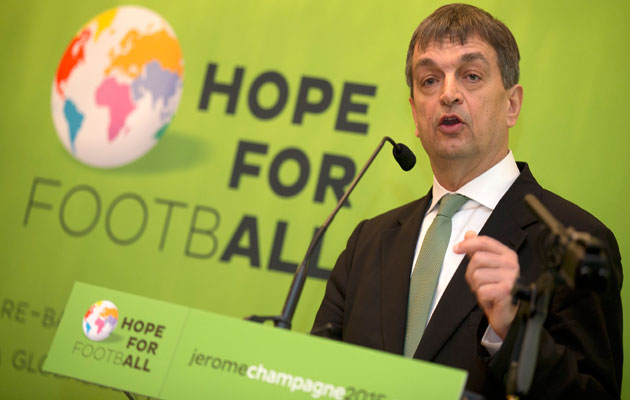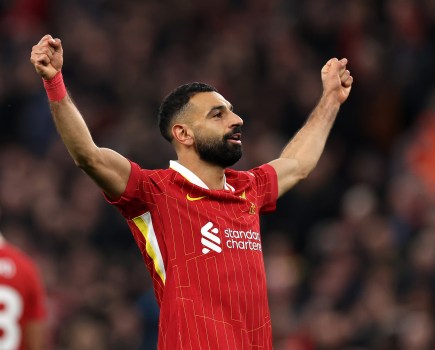World Soccer: How would a Champagne FIFA look?
Jerome Champagne: It would be strong, democratic, inclusive, close to the fans, transparent and absolutely determined to correct the sporting imbalances which come with the economic state of our sport.
It would be a FIFA which would capitalise on what has been done correctly over 40 years, but not afraid of the controversies.
We would have congresses where we debate things and we would need a strong governance which respects the sensitivities of both the DFB, which has eight million regular players but only one vote in congress, and those other federations whose population could not fill the stadium of Dortmund.
What would you want to attack in your first 100 days?
We have some central issues. Immediately we need to focus on a strategy to correct the sporting imbalances in football, whether it’s between continents, inside the continents or inside the leagues. In Switzerland, for example, Basle are bound to win. That’s an illustration of the problem we need to address – and it’s not going to be an easy process.
Secondly, we need institutional reform. We will have to change the statutes so it will be a priority to consult immediately with all the presidents of the FAs. I want to restore the centrality of the power of the FAs. I also want to rebalance the continents. FIFA is not alone; it’s the same debate as about the security council of the UN. Belgium has more voting rights than China because the parameters were set according to the gross domestic product of 40 or so years ago.
The third part will be to look at what we need to do to restore FIFA’s image because if we want to be more proactive we need to be respected. A lot of criticism levelled at FIFA is unfair. When The Daily Telegraph reported a Qatari former president of the AFC gave $2million to the family of a former Trinidadian president of CONCACAF it was “FIFA corruption”.
No – they are confederations. FIFA is not responsible, but we need to restore our authority to be able to say something about these things.
Which statutes would you change?
We need to have some institutional reforms of the ExCo. Imagine that the British people elect a prime minister but when he arrives at Downing Street he finds he has a government already appointed by someone else. In the four years of Mr Blatter’s first mandate, from 1998 to 2002, it was as if Mr Obama had to govern with John McCain and Sarah Palin keeping grudges and trying to sabotage him – not in Congress but in the cabinet itself. This is not a democratic system.
FIFA belongs to the FAs [not the confederations]. That’s why my first proposed reform is to give a majority of seats inside the ExCo to sitting presidents of the FAs elected in the Congress. Yes, we would also have the seats elected by the confederations, but it would mean the president having a majority to carry through the programme for which he had been elected.
The second reform is rebalancing the continental representation within the ExCo. What I propose is, initially, to give one more seat to all the continents which are under-represented. Europe has 54 federations with eight seats; Africa has 54 with four. We need to resolve that.
We also need the other main stakeholders in the ExCo. It’s easy with players because FIFPro has 60 unions but we don’t have world organisations of leagues or of clubs. We need to create that because, if we discuss amendments to the transfer regulations, we need to discuss it with the employers and employees. We can’t decide these things on our own as we did in the past. People aren’t very happy if you behave in an authoritarian way.
Also we need to build a strong “Chinese wall” between the governance of the ExCo and the commercial activities. When there was no money in FIFA the fact that the ExCo approved the commercial contracts had no relevance. That all changed in 1996 and 1997 when the value of the TV rights of the World Cup in 2002 and 2006 multiplied by 10 – today you can multiply the value by 20 or 25 – and a lot of allegations around FIFA have been based on this confusion.
A fifth reform should modify the situation of the general secretary. Gary Lineker – whom I admired as a player – has said Mr Blatter was a dictator.
With all respect, he doesn’t know how it works. The general secretary is proposed by the president and approved by the ExCo and can only be dismissed by the president
with the approval of the ExCo. So now the general secretaries have their own political life because the confederations are their life insurance if they have a fall out with the president. The FIFA president should not be a dictator but have the democratic power to implement the programme on which he has been elected. Today we don’t have that.
Would you rebalance the World Cup slots as well?
I’m not against tinkering with the format because today we have a continent such as Europe which qualifies one out of four of its teams while Africa qualifies only one out of 10. Also, if we want to keep the organisation of big sports events in the democracies we have to redo the way we organise the bidding. FIFA’s responsibility is only for the stadia and the training camps. FIFA should rethink what we impose on the host cities. If you go on vacation to France you have to accept French idiosyncrasies; if you go on vacation to England you accept the weather.
This is an extract from an interview published in the October 2014 issue of World Soccer







